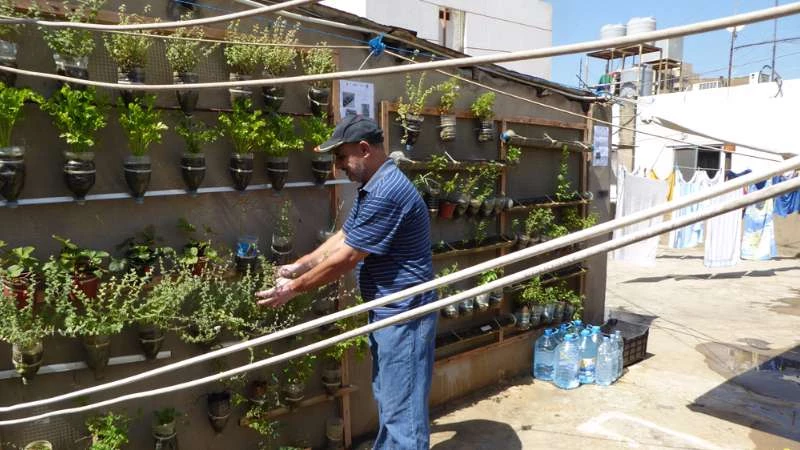Already bursting with strawberries, mint, basil, peppers and celery, the garden is just a month old, but Kazzi - who is living in Beirut as a refugee having fled Aleppo five years ago amid Syria’s war - eventually hopes to be able to make her own salad from the vegetables here.
"I’m a city girl. This is my first time gardening," Kazzi said with a laugh, noting that the garden has provided her with a measure of comfort in trying times. An English literature teacher in Syria, she has been unable to find work in Beirut, while her husband has found only sporadic carpentry jobs - making it difficult to pay the rent and provide for their three children.
"My spirit is relaxed when I’m out here," Kazzi told Al Jazeera, gazing around her little balcony garden. "It provides food and makes the terrace look nice."
This psychological boost is one of the key goals of an initiative aiming to help hundreds of Syrian refugees in Lebanon to grow their own food in rooftop gardens, said Nadim Rawda, the project’s agricultural engineer.
"One strawberry from your own plant tastes better than two kilos of strawberries you have bought," Rawda told Al Jazeera.
Rawda - who is also the vice president of the Food Heritage Foundation, a Lebanese non-profit organisation that seeks to preserve local food culture - believes that any balcony garden should be able to produce the necessities for typical Levantine fare: marjoram, mint, garlic, hot peppers, sweet peppers, tomatoes and thyme.
Of the more than one million registered Syrian refugees in tiny Lebanon, just around 10 percent are considered to be food-secure, according to the United Nations. Several organisations - including the Near East Foundation, the American University of Beirut’s faculty of agricultural and food sciences, and the YMCA - are working on the rooftop gardening initiative, providing refugees with kits, seeds, compost and training.
Project coordinator Mabelle Chedid, a farmer who also works at the American University of Beirut, said that many Syrians in Lebanon come from agricultural backgrounds.
"They have the interest but they don’t have the capacity to expand their produce," Chedid told Al Jazeera. "And once they are producing their food, their expenses will decrease and they are going to be eating something healthy, something they are controlling."
Families taking part in the project, which was launched a year ago, will also be taught how to use a solar dryer, allowing them to sun-dry any fresh herbs they cannot immediately consume. In addition to Syrian refugees, the project also aims to help needy Lebanese families.
In congested Beirut, it is an oasis of green amid a sea of concrete.
With one vertical wall kit, Rawda said, an average family should be able to save a minimum of $ 50 on food costs each month - a significant sum when the monthly average income for Syrian refugee households in Lebanon is $ 165.
Dana Kanaan, the manager of a similar micro-gardening project at the humanitarian aid organisation Intersos, said rooftop gardening also promotes healthier eating.
"Take for example the case of mint, which is 750 Lebanese pounds <$ 0.50>; we go and get it. But for a refugee, they would take that money to buy bread instead," Kanaan told Al Jazeera. "If they grow it, they can just cut a couple of stems and cook with that, and this promotes that fresh food intake."
Intersos, which is launching its micro-gardening project for Syrians in informal refugee settlements in the autumn, uses recycled or low-cost materials for planters, such as plastic barrels and wooden crates.
At its three community centres across Lebanon, Intersos has already started providing training on how to plant kitchen gardens, along with workshops for children and adults on how to grow your own food.
"The psychosocial impact of the project is firstly that contact with nature. A lot of people are actually sitting in agricultural lands and they can’t use the land, or they come from areas "The contact with nature and soil has this therapeutic effect on people."



التعليقات (0)